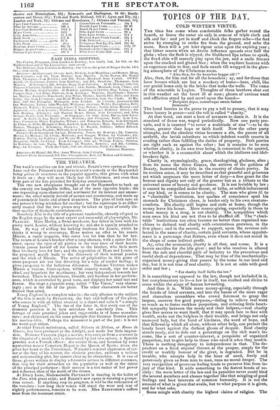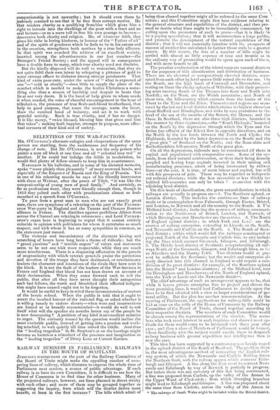TOPICS OF THE DAY.
COLD WINTER'S VIRTUE.
THE time has come when comfortable folks gather round the hearth, or brave the outer air only in armour of triple cloth and silk and fur : and yet in muff and cloak the fingers ache—the feet strive by stamping to strike fire from the ground, and ache the more. Soon will a yet icier rigour seize upon the expiring year ; that bitter season when an Arctic influence spreads over half the globe ; when the flesh is nipped, the blubbered lips refuse to speak, the fixed chin will scarcely play upon the jaw, and a smile freezes upon the cracked and glazed face ; when the wayfarer hastens with an eagerness akin to fear, and feels unsafe till wrapped in the glow- ing atmosphere of the Christmas room.
"Alas, then, for the houseless beggar old !"
Alas, then, for him and for all the houseless ; ay, and for those that have houses which are but a mockery of home—bare, chill, like our genial home only in the bricks that make the walls. The name of the miserable is Legion. Thoughts of those brethren shut out in this weather set the heart ill at ease; ghosts of envious want and affliction stand by and scowl upon the board-
., Deripiunt dapes, contactuque omnia fcedant
Immundo."
The band hurries to the purse to pay a toll to penury, that it may leave luxury in peace—and the toll is called "charity."
At that word, out start a host of accusers to damn it. It is the
standard of fierce war, waged periodically. Now one party pre- vails, and it is vaunted "to cover a multitude of sins "—to be the virtue, greater than hope or faith itself. Now the other party triumphs, and the obsolete virtue becomes a sin, the parent of all unthrift, the lavish substitute to which indolent wealth resorts in evading rather than fulfilling the duties of property. Both parties are right each as against the other ; but it remains to be seen whether charity, in its own true being, is concerned in the quarrel, or whether it is a counterfeit about which the idolizers and idol- breakers fight.
Charity is, etymologically, grace, thanksgiving, gladness, alms
from its name the three Graces, the attirers of the goddess of Beauty, borrowed their title in the country of classic poetry. In its modern sense, it may be described as that graceful and generous actwhich surpasses the mere letter of duty—a free grant for the honour and dignity not only of the granter but as a tribute to the universal sense of beauty and goodness. It is not leviable by law ; it cannot be compelled under threat, or bribe, or selfish inducement of any kind, or it ceases to be charity. The man who gives 5/. to. a "charitable" institution, lest qualms of conscience spoil his
for Christmas cheer, is tender only to his own creature- comforts. His charity still begins and ends at home, though the money leave his house. Mere money-giving, especially in those to whom money is a drug, is not charity. The sympathies which man owes his kind are not thus to be shuffled off. The " chari- table " institutions too often become no better than organized ma- chines to defraud real charity with ostentatious pretence, in the first place; and in the second, to support, upon the revenue col- lected in the name of charity, certain paid servants, whose appoint- ment is a patronage that flatters, even where it does not recoil in the shape of some indirect profit.
Ay, cries the economist, charity is all that, and worse. It is a
barren sacrifice for the idle giver ; and he who receives is allured from the safe and cheerful path of industry to the precarious and rueful sloth of dependence. That may be true of the mechanically- organized money-giving that passes by the name in our land and day, but it is not true of real charity. It is not at odds with good. order and law ;
" For charity itself fulfils the law."
It is something not opposed to the law, though not included in it, but complementary to it—a law in itself, too exalted and divine to come within the scope of human lawmaking.
And thus it is. While mere money-giving, especially through the bands of hired servants, and into the hands of the more eager and shameless scramblers who crowd foremost to grasp the largess, answers few good purposes,—failing to relieve real want so much as to foster reckless pauperism, and evincing little heart- felt sympathy between the needy and their helpers,—real charity gives free access to want itself, that it may speak face to face with wealth, seeks out the helpless in their trouble, and brings not only moneyed help, but the hand of kindness, the word of hope, and that fellowship which all alone, without other help, can protect the lonely heart against the darkest gloom of despair. Real charity stands ready, not to dole out a percentage on the rich man's in- come, like a sort of counter-interest, a perquisite of organized pauperism, but to give help to those who need it when they need it. There is nothing derogatory to independence in that. The de- pendent on a fixed stipend thrown at the pauper, simply for the credit or worldly honour of the giver, is degraded. But he in trouble, who accepts help in the hour of need, freely and generously given as from man to man, runs no moral danger. The very recognition of generous feeling tends to preserve him from in- jury of that kind. It adds something to the fastest bonds of so- ciety: the mere letter of the law and its penalties never could bind the several members and classes together like that mingling of good feelings and best interests of common humanity. It is not the amount of what is given that avails, but to what purpose it is given, and for what sake.
Some mingle with charity the highest claims of religion. The
companionship is not unworthy ; but it should even there be jealously scanned to see that it be free from corrupt motive. He that renders charity as a qualifying franchise which gives him a right to intrude into the dwellings of the poor with a tract and an oral lecture—or as a mere toll to free his own passage to heaven— desecrates both charity and religion. He, of whatever faith, that gives his tithe in loving kindness, in honour of the "Father of all" and of the spirit of goodness which he feels to be in his nature and in the creation, strengthens both motives by a true holy alliance. In that spirit was couched the address of an excellent society, inserted among the advertisements in our last number—the Stranger's Friend Society ; and the appeal will in consequence have a double force to many, which true charity need not disclaim.
But the kindly-disposed will do well to retnember, that they do not quite fulfil their own intent by relegating a pittance of gold to some strange officer to disburse among strange pensioners. That kind of extra poor-rate, under the screw of " what is expected of one "—" cold as charity"—does little to supply the place of the comfort which is needed to make the festive Christmas a some- thing else than a season of hardship and despair to hosts that lie at our very doors. It is the hand of help given to whom needs it when needed, the voice of cheerful encouragement in the hour of tribulation, the presence of true flesh-and-blood brotherhood, that help to good purpose, that rouse the courage, warm the heart, thaw the numbed hand of industry, and set it to work with grateful activity. Such is true charity, and it has no danger. It is like mercy, "twice blessed, blessing him that gives and him that takes"; making both happier, stronger in purpose, more effec- tual servants of their kind and of society.



























 Previous page
Previous page